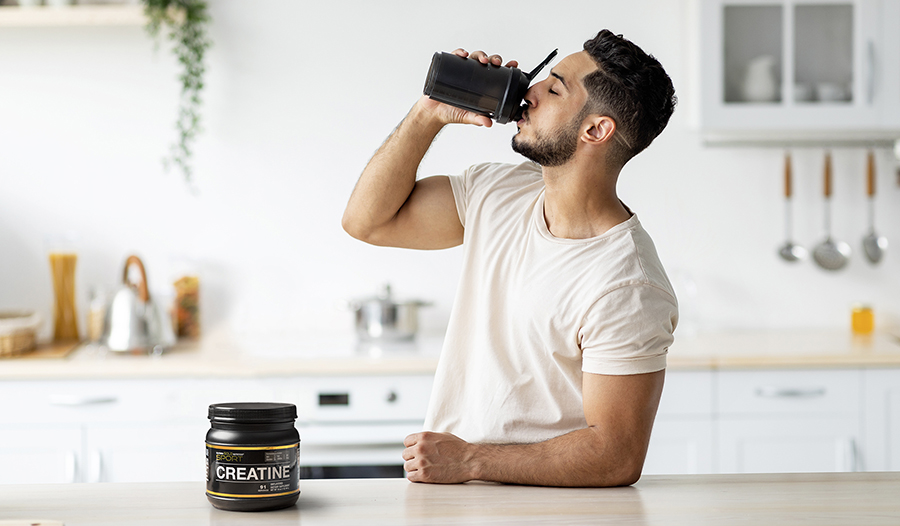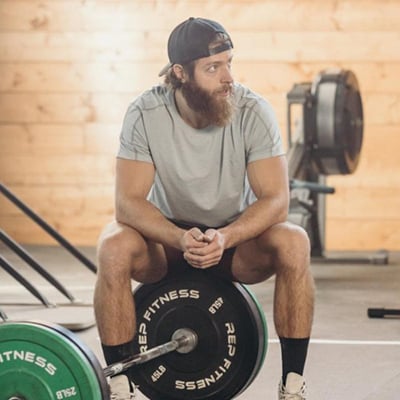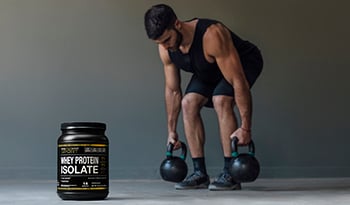Ask a Certified Strength Coach: Can You Only Gain Muscle in a Surplus?
DISCLAIMER:This blog does not intend to provide diagnosis...
- In this article:
- How Do We Build Muscle?
- Can You Only Gain Muscle in a Surplus?
- Additional Muscle-building Aids
- Key Takeaways

When it comes to nutrition and building muscle, there is a common misconception that you can only gain muscle in a caloric surplus. Yes, a caloric surplus can be incredibly beneficial for muscle gain, but it’s not necessary for every lifter who is interested in building muscle.
In this article, we’ll explore how to consider caloric consumption when building muscle and discuss a couple of different contexts in which a caloric surplus is not necessarily needed for building muscle.
Remember, no one set of recommendations works for every person or every context. When it comes to nutrition and muscle gain, individuals’ needs are just that—individual. When thinking about caloric surpluses and how they relate to muscle gain, we need to consider the broader picture of where we currently are with our body weight and body fat, and what our personal goals are.
How Do We Build Muscle?
First, let’s discuss muscle gain and how calories play a role. When we train, we stress our muscle fibers. Following our workout or stressful bout of activity, our body repairs these muscle fibers so they are stronger and more resilient to future stress from workouts.
Our bodies use amino acids from protein to build muscles. Amino acids are the building blocks of protein and help drive how efficient we are at using the protein we consume to build muscle. Countless hormones in our bodies also influence how efficient we are at building muscle.
The foods we eat are made up of three macronutrients—fats, carbohydrates, and proteins. Each macronutrient plays different roles in the body and is used for different tasks. When we train hard and consume adequate protein, generally we use that protein to repair muscles that were stressed during the training.
Calories are units of energy and are a measurement of the fuel your body uses to perform its many functions. When you do not consume enough calories to match what your body consumes, your body uses stored fat to fuel its functions. If the caloric deficit is great enough, your body will actually break down skeletal muscle as a source of fuel.
For this reason, it’s important to consume adequate calories and protein to ensure you’re able to build muscle efficiently per your training sessions and goals.
Can You Only Gain Muscle in a Surplus?
We are all at different places on our journey as athletes. Some of us have been training for years and some of us are hitting the gym for the first time. Just as each of us is on our individual fitness journey, our nutrition needs are individual. The needs of an experienced, well-trained athlete look much different than those of someone taking their first steps.
Let’s take a closer look at the needs of athletes at different levels of fitness. Well-trained athletes with significant experience may benefit from having a caloric surplus when trying to build muscle. Other people may not need a caloric surplus to gain muscle and improve their body composition.
I’ve broken down the sections below so you can find the information that best suits your level of fitness.
Training Experience 1 to 2+ Years (Intermediate and Advanced Lifters)
Lifters and athletes who have been formally training for a year or more and have moderate to lower body fat percentages need a caloric surplus to optimize muscular hypertrophy gains. Having a low body fat percentage and a high level of fitness are both major drivers of efficient muscle building.
The size of the surplus needed for muscular growth varies. Likewise, the rate at which you'll make hypertrophy gains varies based on multiple individual factors. Some of these individual factors include nutrition, genetics, training history, and recovery abilities. How you respond to your individual training also plays a role.
Generally, intermediate and advanced lifters require some level of caloric surplus to optimize muscular hypertrophy. As you develop more lean body mass and continue to build a larger base of muscle, your body needs more resources to develop additional muscle.
Do note, we are not talking about the development and expression of strength. Strength is a separate adaptation distinct from pure muscular hypertrophy in the context of a muscle gaining phase. You can certainly get stronger eating at maintenance and sometimes even in a deficit, but this does not mean you'll necessarily increase your muscle size via muscular hypertrophy.
Beginners and High Body Fat Lifters
Next, let’s examine the needs of beginners and people with obesity who have little training experience and less lean body mass.
Does this population need a caloric surplus to gain muscle? The short answer is no. There are a couple of reasons why these populations don't necessarily need a surplus to gain muscle.
Firstly, one of the reasons we physically gain muscle mass is the accumulation of proteins within the muscles. By providing the body with ample amino acids—the building blocks of proteins—and training on a regular basis, you can accumulate proteins within your muscles.
The combination of ample amino acids and regular training helps to create a positive Net Muscle Protein Balance (NBAL) in the body. A positive NBAL creates an environment more conducive to building muscle. Hence why consuming adequate protein is important no matter where you start or are in your training journey.
Often, beginners and those with higher body fat percentages can create a more positive NBAL and build muscle by simply altering their current diet. If your protein intake is typically low and you have no formal dietary strategy for building muscle, you don’t need to go into a gaining phase to gain muscle—you just need to shift your macronutrient intake to create an internal environment that is conducive to gaining muscle. Protein and casein powders can be useful, easy options for upping your protein intake.
In practice, this might mean reducing your consumption of fat and carbohydrates and increasing your protein intake, while keeping your total caloric intake the same. Keep in mind, as your training and body composition shift, your caloric needs will likely change too.
Secondly, beginning athletes and people with obesity usually have less lean body mass or muscle tissue. By shifting macronutrients and diet structure, their bodies will start adapting to regular training and form more muscle naturally to match the novel external stimuli provided from resistance training. This doesn’t necessarily require a surplus.
If you are just beginning your training, are restarting training after a hiatus, or have excess weight, note that the rate at which you'll gain muscle when doing a body recomposition—also called a body “re-comp”—will vary based on multiple factors, including:
- Training age (the cumulative amount of time you’ve spent training for a particular sport)
- Current body fat levels
- Genetics
- Training history (sports, too!)
- Age
- Sex
This list goes on. The point is that you can shift your body composition and gain muscle eating at maintenance, and even sometimes at a deficit if you're a true beginner or someone who has high levels of body fat and lower levels of lean body mass.
The novel stimulus of training and eating enough protein will generally be enough to help you build muscle without a surplus and to create a more positive NBAL.
Additional Muscle-building Aids
Whether you are a seasoned lifter or taking the first steps on your lifting journey, you may wonder whether you should be taking supplements that are marketed to help you build muscle. These include:
- Creatine: This molecule found naturally in your body may help you build stronger muscles and increase muscle mass over time.
- Weight-gainers: These high-calorie supplements can help you meet your caloric and protein needs if you are having trouble consuming enough food. Keep in mind, it is always best to get your calories through a nutritious, balanced, whole-food diet.
- Beta-alanine: Some research suggests this amino acid can improve exercise performance and increase muscle mass with exercise.
- HMB: Also known as beta-hydroxy beta-methylbutyrate, HMB is produced when your body metabolizes the amino acid leucine. This supplement may help build muscle, especially in people who are just starting out with weight training.
- Citrulline: This amino acid is found naturally in the body and in foods. Some research suggests it can help increase blood flow to muscles by widening blood vessels. It may also improve athletic and weight training performance.
If you are eating at least as many calories as you are burning, consuming adequate protein, and engaging in regular, challenging training, you don’t need supplements to build muscle. However, some people find them helpful for reaching their goals faster.
Talk with your registered dietitian, physician, or other qualified healthcare practitioners before starting any new supplements to make sure they are safe for you.
Key Takeaways
If you're an intermediate or advanced lifter/athlete with moderate to lower levels of body fat and a solid base of lean body mass, then you'll need some form of caloric surplus to optimize muscular hypertrophy gains.
Remember, we’re talking purely about muscular hypertrophy in this context and not the expression of strength, power, and other realms of athleticism.
Conversely, if you're a true beginner or have higher body fat/lower lean body mass, to begin with, then you can use a re-comp phase to build muscle, which will likely resemble eating at maintenance or in a small deficit. You probably won’t need a surplus to kickstart your gains.

 By Jake Boly, CSCS
By Jake Boly, CSCS


